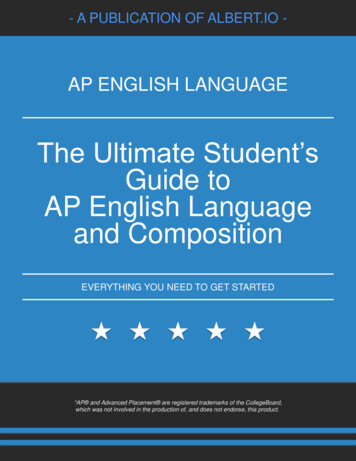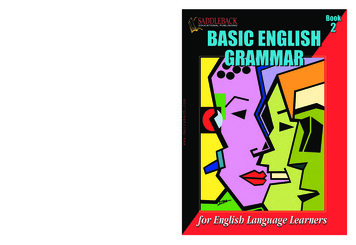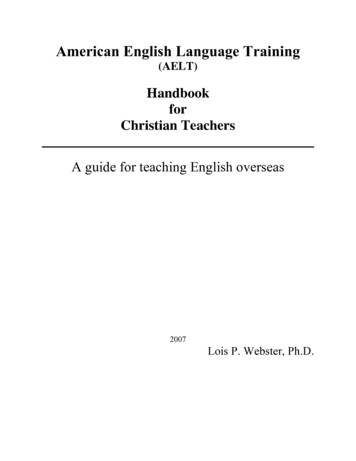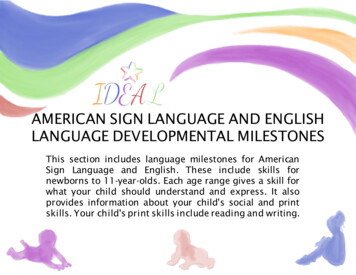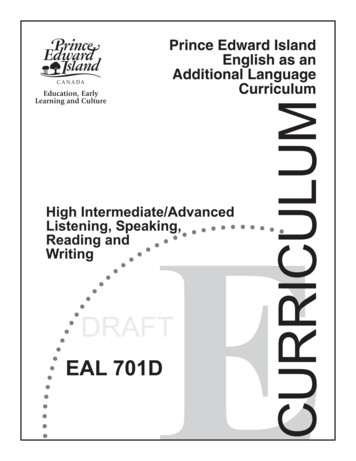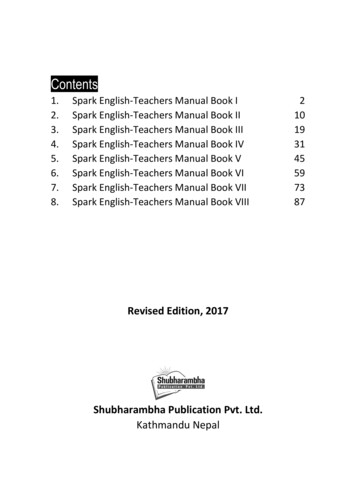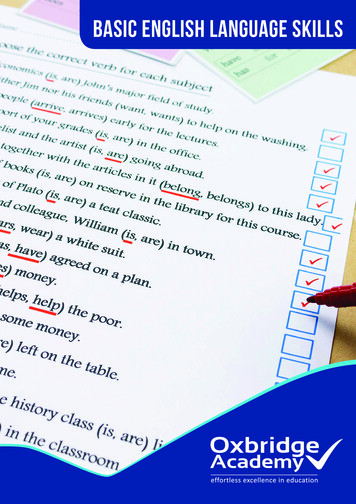
Transcription
BASIC ENGLISH language skills
Basic English Language SkillsAll rights reserved. No part of this publication may be reproduced or transmittedin any form or by any means, electronic or mechanical, including photocopying,recording, or any information storage or retrieval system, without prior permission inwriting from the publisher. Subject to any applicable licensing terms and conditions inthe case of electronically supplied publications, a person may engage in fair dealingwith a copy of this publication for his or her personal or private use, or his or herresearch or private study. See Section 12(1)(a) of the Copyright Act 98 of 1978.The authors and the publisher have made every effort to obtain permission for andto acknowledge the use of copyright material. Should any infringement of copyrighthave occurred, please contact the publisher, and every effort will be made to rectifyomissions or errors in the event of a reprint or new edition.Developed for Oxbridge Academy - 2015Developed for Oxbridge Academy
Basic English Language SkillsTABLE OF CONTENTS:1.General Language Tips to Get You Started2.Parts of Speech3.Punctuation4.Commonly Confused Words and Phrases5.Tips for Filling in Your College Registration Form6.Learn How to Summarise Your Study Material7.How to Ask for Help from Your Tutor8.Tips for Completing Your Written Assignments9.Tips for Answering Exam Questions10. Language Skills at Work – How to Write a Cover Letter11. Language Skills at Work – How to Write aResignation Letter12. Language Skills at Work – Sending E-mails to Your Colleagues
Basic English Language SkillsCHAPTER 1:GENERAL LANGUAGE TIPS TO GET YOU STARTEDThis chapter focuses on the importance of language skills in theworkplace, and covers basic tips for how you can improve yourcommand of the English language.“The English language is nobody’s special property.It is the property of the imagination.It is the property of the language itself”Derek WalcottDeveloped for Oxbridge Academy
Basic English Language SkillsWhen we think about our careers, and what we need to do to establish them, weoften forget about the need to develop an essential skill: communication. If youstart reading through the job descriptions in a industry, you will find that the vastmajority of jobs require one or more of the following: Effective communication skills Interpersonal skills Ability to work in a team Negotiation skills Conflict resolution skills Report writing skillsWhat all of these skills have in common is that they involve the use oflanguage to achieve a particular purpose. And for this reason, having goodlanguage skills is essential in any working environment.In a career context, good language skills can also: Affect your credibility. Poor grammar indicates to a prospectiveemployer that you are sloppy, while flawless grammar indicates thatyou pay attention to detail. Improve your relationships with your co- workers. If you are able Increase your chances of being promoted. Help you to create a good impression. Improve your ability to persuade others (which is a valuable skill in theto express yourself clearly, you can eliminate the confusion andmisunderstanding that often leads to conflict.working world).
Basic English Language SkillsIN THIS E-BOOK, WE’LL BE HELPING YOU TO: Develop your basic English language skills. Improve your English grammar.Apply your language and communication skills in a business contexT.(www.oxbridgeacademy.co.za/find-a- course/business-administrationcourses/)“Grammar is a litmus test. If job hopefuls can’t distinguishbetween ‘to’ and too’, their applications go into the bin”Kyle Wiens, CEO of iFixit“Grammar often seems to be a low priority in education. Areschool undervaluing grammar, given that employers may rule outapplications with sloppy writing?”The New York TimesDeveloped for Oxbridge Academy
Basic English Language SkillsTo start off with, here are a few tips for improving your generallanguage and communication skills:1.Read as much as possible. Reading improves your vocabulary,and helps you to become familiar with sentence structure,word order, and the correct use of punctuation.2.Invest in a good dictionary. When you are unsure of themeaning of a word, or when you come across an unfamiliarword, make sure to look it up in your dictionary.3.Keep a journal. This will give you an opportunity to practiceyour writing skills on a regular basis.
Basic English Language SkillsCHAPTER 2:PARTS OF SPEECHParts of speech are used to construct meaningful sentences.Language is made up of many different combinations of words andsentences that we use to communicate with one another.Different types of words have different roles to play within sentences, anddifferent types of sentences perform different functions.In this chapter, we’ll be showing you how different types of words (calledparts of speech) are used to construct meaningful sentences.Developed for Oxbridge Academy
Basic English Language SkillsNOUNSThe job of a noun is to name something. It might be an object, a person,a place, or even a thought or idea. There are different types of nouns:Common nouns: Refer to an object that you can see or touch.Example: table, chair, dogProper nouns: Indicate the name of a person or place. Proper nounsalways start with a capital letter.Example: South Africa, Oxbridge Academy, Desmond Tutu, ToyotaAbstract nouns: Refer to concepts, rather than to things that you candetect with your senses.Example: love, courage, hope, innovationCollective nouns: Are used to name a group or collection of peopleor things.Example: “board” of directors, “litter” of puppies, “herd” of cattle
Basic English Language SkillsPRONOUNSA pronoun is a word that can be used to replace a noun, and is usuallyused to avoid repetition of the noun.Example: love, courage, hope, innovationVERBSVerbs are “doing” words. They express actionsExample: reading, speaking, walking, swimmingVerbs can be used in the past, present, or future tense.Example:Past tense:Mr Smith drove to work.Present tense:Mr Smith is driving to work.Future tense:Mr Smith will drive to work.Subject-verb agreement: In English, there is a rule that verbs mustagree with their subjects in number and personExample: He drives to work. He is driving to work. (in singular form)They drive to work. They are driving to work. (in plural form)ADJECTIVESAdjectives are words that are used to describe nouns. They usuallygive more information about the nouns, and answer questions such as:“What kind?” “Which one?” “How many?” “How much?”Example:the red busthe unscheduled meetingan inaccurate reporta hard-working employeeDeveloped for Oxbridge Academy
Basic English Language SkillsADVERBSAdverbs are words that give more information about verbs. They answerquestions such as: “How?” “Where?” “When?” “To what extent?”Example:The meeting was promptly adjourned. (How?)She saw the direPREPOSITIONSA preposition is used to describe the relationship between a noun (orpronoun) and another word or phrase in a sentenceExample:She found the report on her desk.The door is behind him.He walked around the office.CONJUNCTIONSConjunctions are joining words.They are used to join words, phrases and clauses in a sentence.The most frequently-used conjunctions include:and, but, for, nor, or, yet.Example:She works in sales and marketing.He wanted to attend the conference, but he could not find the venue.I can’t remember whether he is studying bookkeeping or accounting.He missed his bus, yet he still made it to work on timeTo read more about parts of speech, you can go to the following links: www.5minuteenglish.com/grammar.htm www.englishclub.com/grammar/parts-of-speech- table.htm www.english-grammar-revolution.com/parts-of- speech.html
Basic English Language SkillsCHAPTER 3:PUNCTUATIONParts of speech are used to construct meaningful sentences.?Punctuation refers to the various signs and symbols that are used inwritten language to: Clarify meaning Show emphasis Break passages of text into separate parts, making them easierto readPunctuation rules are there to make sure that we all use punctuationmarks consistently. If we all used punctuation according to our ownpreferences, it would become incredibly confusing, and it would no longerhelp to clarify the meaning of our text.Developed for Oxbridge Academy
Basic English Language SkillsHave a look at the table below to see the most importantpunctuation rules:PUNCTUATIONRULES:EXAMPLES:.Full stopA full stop is used to end a sentence.Mary is writing an exam on Monday. If she passes theexam, she will be able to apply for her dream job.?Question markA question mark replaces a full stop atthe end of a sentence if the sentence isphrased as a question.Will you please close the door?Exclamation markAn exclamation mark is used instead ofa full stop to indicate strong emotionin a sentence. Exclamation marksshould be used sparingly, especially inacademic work.He made me so angry! Hurry up!SemicolonA semicolon is used to link two relatedclauses, or to separate items in a list(where the list already contains commas).!;Commas are used:To separate items in a list.,CommaLinking related clauses: Your report was helpful; it explained the reasons for the committee’s decision.Separating items in a list: Switzerland, Germany, andAustria are in Europe; Brazil, Uruguay, and Argentina arein America; and Japan, Korea, and China are in Asia.She bought bread, milk, and eggs at the shop.To separate clauses in a sentence.My friend, who is also an athlete, gave me a pair of running shoes for my birthday.To separate quotations from the rest ofa sentence.He asked, “How far do we still have to go?”Before co-ordinating conjunctions whenthey join two independent clauses.It was raining outside, but they decided to go swimminganyway.After a dependent clause at the beginning of a sentenceWhen I arrived at work, I realised that I had left my officekey at home.When addressing someone or something directly.“John, will you please print this document before themeeting?”A colon is used to introduce the secondpart of a sentence when the secondpart explains or expands upon the firstpart.There is only one way to fix this: we have to start over.:Colon’ApostropheAn apostrophe is used to indicate possession, or to indicate that letters havebeen omitted from a word.Possession: The director’s office was locked.Omission: He wasn’t there. (“was not” becomes “wasn’t”)“Where have you been?” he asked.Inverted commasInverted commas, or quotation marks,are used to indicate direct speech, orto indicate that text is being quotedfrom another source.A hyphen is used to join words, or tojoin words and letters/numbers.Forming compound adjectives: rose-coloured, prize-winner, hand- pickedAdding prefixes: pre-release, pre- production, pre-qualify,non-verbal Joining words with letters/numbers: pre-2014,X-ray, C-section.En dashes are used to replace thewords “to” or “through”.The company’s financial year runs from March – February.An em dash is used to emphasise theclause that follows it, to separate aphrase from the rest of a sentence, orto indicate an interruption or change inthought.Emphasising a clause: I’m the serious one — you have allthe fun.Separating a phrase: He was the one — the only one —who was brave enough to enter the building.Indicating a change/interruption: “I really need a new —oh, never mind, I found the old one.”“-Hyphen-En dash—Em dashThe following items must be included with your CV: acover letter, a copy of your ID, and a copy of your Matriccertificate
Basic English Language SkillsCHAPTER 4:COMMONLY CONFUSED WORDS AND PHRASESAcceptorExcept?Words are the building blocks of our language, and choosing the correctwords is vital for communicating effectively. Choosing the correct wordin a given situation can make the difference between getting your pointacross clearly and offending your audience unintentionally.Unfortunately, English is a tricky language, filled with many confusing words and phrases. And as a result, it’s often difficult to rememberwhich words you need to use in a particular context.Developed for Oxbridge Academy
Basic English Language SkillsUSING THE WRONG WORD CAN SOMETIMES HAVEAMUSING (AND EMBARRASSING) RESULTS.As you can probably tell from the image above, using the wrong wordcan sometimes have amusing (and embarrassing) results. In somesituations, however, the effect of using incorrect words may be moreserious.In academic or business writing, for example, the words that youchoose will influence the reader’s opinion of you.Incorrect word choice in an exam or assignment may cause you to losemarks, while using the wrong word in a business letter may create a badfirst e/business-administration-courses/)
Basic English Language SkillsTo help you choose the right words in various situations, we’vecompiled a list of commonly confused words in the Englishlanguage, along with examples of how to use them correctly:Accept/ExceptTo “accept” something means to receive or approve of it.E.g. Jane accepted the apple gratefully.“Except” means that something is being excluded.E.g. She would eat any fruit except oranges.Advice/Advise“Advice” is a noun.E.g. John gave him advice regarding his bank loan.“Advise” is a verb.E.g. John advised him that it was a bad idea to take out a third bankloan.Affect/EffectTo “affect” something is to make some change to it.E.g. The power cuts affect the company’s ability to manufacture goods.To “effect” something is to bring it about, to put it into effect.E.g. He effected the change in schedule when he realised that productionwas too slow.An “effect” is a change that occurs as a consequence of somethingelse.E.g. The power cuts had a negative effect on the company’s ability tomanufacture goods.Developed for Oxbridge Academy
Basic English Language SkillsApprove/Approve ofTo “approve” something is to give consent.E.g. The director approved the budget.To “approve of” something is to express a favourable opinion about it.E.g. The mother did not approve of the way her daughter was dressed forthe school dance.Borrow/LendTo “borrow” something is to take it with the intention of giving it back.E.g. He borrowed the book from his colleague.To “lend” something is to give it to someone with the expectationthat they will give it back.E.g. She is lending the car to him so that he can drive to work today.Compliment/ComplementYou “compliment” someone when you make a favourablecomment about them.E.g. He complimented her by telling her that she was a good writer.You “complement” something (or someone) when you addsomething else to it that suits or fits it well.E.g. That scarf complements her dress.
Basic English Language SkillsContinual/ContinuousIf something happens frequently, it is “continual”.E.g. The trains were continually late.If something happens all the time without interruption, it is“continuous”.E.g. It rained continuously for three days.Its/It’s“Its” indicates possession.E.g. The company improved its performance by hiring new staff members.“It’s” is a contraction of “it is”.E.g. It’s uncertain whether the company will meet the financial targetsthis year.Principal/PrincipleA “principal” is the head of a school or college.E.g. The principal declared that the school term would be extendedby a week.A “principal” thing is a main or most important thing.E.g. His commitment to the task was the principal reason for his success.A “principle” is a fundamental rule or belief.E.g. It goes against my principles to eat meat.Developed for Oxbridge Academy
Basic English Language SkillsStationary/Stationery“Stationary” means not moving.E.g. The stationary truck held up the traffic.“Stationery” refers to writing materials.E.g. She needed new stationery for school.There/Their/They’re“There” is a preposition that refers to a place.E.g. He will be there in ten minutes.“Their” is a possessive pronoun. It indicates that somethingbelongs to them.E.g. Due to unforeseen circumstances, their meeting was cancelled.“They’re” is a contraction of “they are”.E.g. They’re not going to be pleased when they find out that he lostthe report.To/Too/Two“To” is a preposition, and indicates the relationship between onething and another.E.g. I gave the letter to him.“Too” means “also”, “additional” or “more than what is necessaryor desirable”.E.g. He is going on holiday too. As a result, there are too few peopleavailable to work over December.“Two” is a number.E.g. There are only two staff members in the office.
Basic English Language SkillsUninterested/Disinterested“Uninterested” means not interested.E.g. The spectator was uninterested in the outcome of the game, as hedid not support either of the teams on the field.“Disinterested” means impartial or unbiased.E.g. The judge was disinterested in the matter.Your/You’re“Your” is a possessive pronoun.E.g. Your assignment was due two days ago.“You’re” is a contraction of “you are”.E.g. You’re supposed to be at work today.Developed for Oxbridge Academy
Basic English Language SkillsCHAPTER 5:TIPS FOR FILLING IN YOUR COLLEGE REGISTRATION FORMApplying for college (www.oxbridgeacademy.co.za/enrol-now/) can be adaunting experience. Not only do you need to choose a course, but youalso need to make sure that you: meet the entry requirements meet the deadlines fill in the forms correctly send the forms to the right address include all the necessary attachmentsTo make the college registration process easier for you, we’ve compiled acomprehensive guide on how to register at Oxbridge Academy(www.oxbridgeacademy.co.za/enrol-now/). The guide also includes generaltips that will be relevant to the application and registration processes atother colleges.There are 4 steps you need to follow when you want toregister as a student at Oxbridge Academy:1.Select Your Course2.Fill in Your Student Details3.Select Your Delivery Option4.Pay Your Registration Fee and Send in Your Form
Basic English Language SkillsSTEP 1 – SELECT YOUR COURSEOxbridge Academy Short Course: Marketing ManagementADV101Before you start filling in the registration form, you need to choose yourcourse. Once you’ve identified the course that you would like to study,remember to check that you meet the entry requirements.You can find the course name and course code for your chosen course onthe relevant detailed course information page on our website. Have a lookat the example in the screenshot below (the course name and course codeare circled in red):Please make sure to check the accreditation status of your chosen course.Some of our courses are non-credit bearing skills development courses,which are neither accredited by external bodies nor registered on the NQF.Please go to our website: oxbridgeacademy.co.za for more informationabout our skills development courses.Developed for Oxbridge Academy
Basic English Language SkillsSTEP 2 – FILL IN YOUR STUDENT DETAILSTo complete this section, you need to provide us with your personaldetails:E-mail addressPlease provide a valid e-mail address that you check on a regularbasis, as we’ll be using this address to communicate with youthroughout your studies.OccupationRefers to your current job (if you are employed). If you areunemployed, you can simply write “unemployed” or “not applicable”.Delivery addressRefers to the address at which you want your study material to bedelivered. The reason why we prefer you to select your work addressis so that there will always be someone available to receive yourstudy material, even if you are not there when the courier arrives.
Basic English Language SkillsPLEASE REMEMBER TO ATTACH THE FOLLOWINGDOCUMENTS TO YOUR REGISTRATION FORM:A copy of your IDProof of your highest grade passedProof of any other relevant qualifications you have obtainedDeveloped for Oxbridge Academy
Basic English Language SkillsSTEP 3 – SELECT YOUR DELIVERY OPTIONIn this section, you need to place a cross in the box next to the methodby which you would like to receive your study material. In the exampleabove, the student has indicated that they would like to receive theirstudy material via registered post.
Basic English Language SkillsSTEP 4 – PAY YOUR REGISTRATION FEE AND SEND INYOUR FORMDifferent courses have different registration fees. Please check the coursefees list (www.oxbridgeacademy.co.za/Documents/ Price-list-2015.pdf) tofind out how much you need to pay to register for your chosen course, andpay this amount using the banking details provided at the bottom of theregistration form. Remember to attach your proof of payment.If you are under the age of 18, your parent or guardian will need to signthis section of the form to state that they are aware of your registrationwith Oxbridge Academy, and that they do not have any objections. If youare unemployed, you will need a guarantor to sign this section of theform. Your parent or guarantor will be held responsible if you miss any ofyour payments in relation to your course fees.Developed for Oxbridge Academy
Basic English Language Skills1A Summary of theCHOOSE YOUR COURSERegistration Processat Oxbridge AcademySEND YOUR REGISTRATION FORMFILL IN THEREGISTRATION FORMSend your registration form to theregistrations office at Oxbridge Academy viaone of the following channels:The registration formfollows an easy-to-completefour step layout.2Fax:Post:E-mail:As soon as your detailshave been capturedon our system you willreceive confirmationof your registration viae-mail or SMSIF YOU ARE REGISTERINGFOR an ICB, or NATEDCOURSEmake sure to indicate yourpreferred exam centre.3IF YOU ARE UNDER18, OR IF YOU AREUNEMPLOYEDmake sure that yourparent/guardian/guarantorsigns the form.4086 262 5550PO Box 12723, Die Boord, 7613registrar@oxbridgeacademy.co.zaATTACH THE FOLLOWINGDOCUMENTS1.Copy of your ID2.Proof of highestgrade passed3.Proof of otherqualifications4.Proof of paymentPAY YOURREGISTRATION FEE56
Basic English Language SkillsCHAPTER 6:LEARN HOW TO SUMMARISE YOUR STUDY MATERIALTo be successful in your studies, you need to learn how to createmeaningful summaries of your course material. This is especiallyimportant if you are a distance learning student (www.oxbridgeacademy.co.za/distance-learning/), as you won’t have a teacher or lecturer topoint out key concepts, or to give you tips about the types of questionsyou can expect in the exams.SUMMARISING YOUR WORK GIVES YOU AN OPPORTUNITY TO: Organise your study material into a structure that makes sense to you. Arrange your study material into a format that suits your learning style. Create memory aids for yourself. Identify key ideas and concepts. Focus on what’s important. Prepare for exams more easily.Developed for Oxbridge Academy
Basic English Language SkillsSO WHAT EXACTLY IS A SUMMARY?A summary is more than just a condensed or shortened version of yourwork. A summary requires you to analyse your study material, to identifythe key concepts, and to explain it in your own words.To make a good summary, you need to: Keep it brief. Make sure to use main headings and keywords. Focus on the main ideas. Classify and organise the information in a logical manner. Use your own words where possible. Include examples. Remember that your summaries are there to help you.YOU CAN MAKE YOUR SUMMARIES IN DIFFERENT FORMATS. HERE ARE SOME EXAMPLES:Mind Maps (Spider Diagrams)A mind map is a visual expression of thoughts, ideas and concepts. Itusually takes the form of a diagram, with the main concept in the centre,and the related concepts branching out from there. Here is an ainingDiscipline
Basic English Language SkillsThe benefits of using mind maps include the following: They help you to see how the different bits of information fit into thebigger picture. They help you to understand the relationships between concepts. They help you to memorise information more quickly (by engagingboth hemispheres of your brain).Tips for making mind maps: Use different colours to distinguish between concepts. Use key words and phrases, instead of writing in full sentences. Include images/drawings that are relevant to the topic(s). Use arrows to show how different concepts are related.BULLET POINTS OR LISTSIf you find that you memorise things more easily when they are in listform, then it might be a good idea to use bullet points when summarising your work.Using bullet points can help you to understand (and memorise) yourwork more easily, as it requires you to: Identify the key points that you want to include in your lists. Come up with a logical structure for your lists. Categorise information into relevant lists.Here is an example:Payroll Pay salaries on time Make necessarydeductions Calculate overtimeHR Manager’s DutiesContracts Draft employmentcontracts Ensure safekeeping ofemployment contractsTraining Establish staff trainingneeds Establish skills gaps Take responsibility forsuccession planningDeveloped for Oxbridge Academy
Basic English Language SkillsFLASH CARDSFlash cards are pieces of paper (or card) with questions on the oneside, and corresponding answers on the other side.Here is an example:frontWhatdoes OHSstandfor?backOccupationalHealthand SafetyTips for using flash cards: Include images/visual cues on your flash cards, as this will help you tomemorise the contents. When studying, shuffle your deck of flash cards regularly (to makesure that you aren’t simply memorising the order of the answers). Add new flash cards to your deck as you cover new topics or learnnew concepts.
Basic English Language SkillsSUMMARIESGeneral Tips for Making Summaries Underline or highlight key points as you work through your studymaterial, and make notes. When you come across a word or concept you don’t understand,look it up in a dictionary, or do some research on the concept, andadd your own definition to your summary.Developed for Oxbridge Academy
Basic English Language SkillsCHAPTER 7:HOW TO ASK FOR HELP FROM YOUR TUTORAs a student, you are going to experience times when you need helpwith your studies. You might be unsure about an assignment question,you might be confused by a particular concept, or you might be stressedabout the upcoming exams.And if you are studying via distance learning (www.oxbridgeacademy.co.za/distance-learning/), where you don’t have any face-to-face interaction with lecturers, you will need to rely on your tutors for the necessaryacademic support.
Basic English Language SkillsIf you have any questions about your course work, you are alwayswelcome to approach your tutors for help. Just remember that yourtutors cannot guess what your needs are: you will have to makecontact with your tutors and communicate your questions clearly ifyou want to get the assistance that you need.When it comes to contacting your tutors, your best option willusually be to send an e-mail.Here are some important tips to keep in mind whenrequesting help from a tutor via e-mail:Use a relevant and descriptive subject line.This way, your tutor will immediately know what your e-mail isabout, and he or she will be more likely to open it. A good subjectline might read as follows: “Enquiry regarding Assignment 1 forSafety Management 101”Be polite, and use an appropriate form of address.Always start your e-mail with an appropriate form of address,such as “Hello Mr/Ms ” and sign it off with your full name andstudent number. This will help to give your message a friendly, yetprofessional tone.Be clear and concise.Make sure that your tutor will be able to understand what it is thatyou are asking.Developed for Oxbridge Academy
Basic English Language SkillsCompare the following examples:Example AExample B
Basic English Language SkillsBy stating the problem clearly, and by asking a specific question thatyou would like your tutor to answer, such as in example B, you are muchmore likely to get a meaningful response from your tutor.Don’t use text-speak (such as “ur” and “pls”) in your e-mail.Not only does this look unprofessional, but your tutor may have a hardtime understanding what it is that you are trying to say. You should alsoavoid using emoticons ( ;-) ), as these don’t belong in formal communication.Proofread your e-mail.Read through your e-mail to make sure you have: Stated your question/problem clearly. Used a suitable tone. Used correct grammar.Also use spellcheck to make sure that there are no spelling mistakes. Ifyou make spelling mistakes, you will give your tutors a bad impression,as it makes your writing look sloppy.Check that you have typed in the correct e-mail address.It’s easy to type in the wrong address by mistake.Take care when sending attachments.If you need to send an attachment, make sure that it is in an accessiblefile format,and that the size doesn’texceedthe maximumlimit. Many e-mail clients limit the size of attachments to 5 MB -- and ifyour attachment exceeds this size, your e-mail might not be delivered.Say “thank you”.If you receive a reply from your tutor, it is good manners to acknowledgereceipt of the response by sending a “thank you” e- mail.By following these tips, you are more likely to establish good relationshipswith your tutors, as well as to get the type of academic support thatyou need.Remember that asking for help is a sign of strength. And asking forhelp early on in your studies will increase your chances of success.Developed for Oxbridge Academy
Basic English Language SkillsCHAPTER 8:TIPS FOR COMPLETING YOUR WRITTEN ASSIGNMENTSDepending on which course you study, you will either be assessedby means of written assignments, or through a combination ofwritten assignments and exams. Assignments not only help todeepen your understanding of the work, but they often also counttoward your final mark.It is therefore important that you put effort into your assignments,and that you complete them to the best of you
asic English anguage kills asic English anguage kills. To start off with, here are a few tips for improving your general language and communication skills: 1. Read as much as possible. Reading improves your vocabulary, and helps you to become familiar with sentence structure, word order, an
